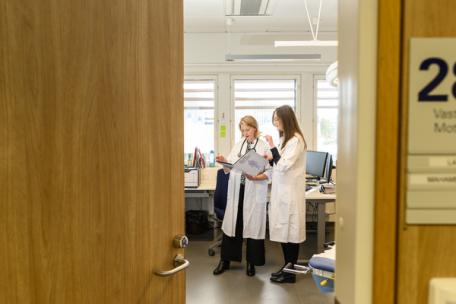The City’s business services, cooperation with higher education institutions and investment attraction
The City’s rapid growth rate has caused challenges for companies with larger space needs, as the increasingly dense structure has resulted in a lack of space. Cooperation between the City and higher education institutions has been active.
Read more about the City’s business services, cooperation with higher education institutions and investment attraction ›
Accessibility of daycare facilities and realisation of pedagogical objectives
The City of Helsinki’s daycare centres can easily be reached on foot or by public transport. The daycare facilities largely provide a good learning environment, but there is a lack of quiet spaces suitable for small groups, according to users.
Read more about the accessibility of daycare facilities and the realisation of pedagogical objectives ›
Swedish-language health and social services for families with children
In most of the services assessed, Swedish-speaking client families are provided with the same or, in some services, even better service than Finnish-speaking ones. The City purchases Swedish-language services in certain individual child welfare services where it does not have any Swedish-speaking staff.
Read more about Swedish-language health and social services for families with children ›
Reducing homelessness
Helsinki is a pioneer in reducing homelessness. Housing counselling helps to avoid evictions, which have a high financial and human cost. There is still room for improvement in the safety of emergency housing services.
Read more about reducing homelessness ›
Information flow and cooperation between basic education and Child Welfare
Information exchange and cooperation between basic education and the child welfare needs assessment unit have primarily followed the City's guidelines. However, there are many guidelines and they are not clear and consistent in all respects. The consultation practices of pupil welfare and Child Welfare are effective, and staff competence has been developed.
Read more about information flow and cooperation between basic education and Child Welfare ›
Functioning of the service voucher system in primary health care
The use of the service voucher has not significantly contributed to the functioning of primary health care and smooth access to treatment at health stations, as it is only suitable for a small proportion of health station clients, and the availability of the voucher is limited. The service voucher has, however, improved access to treatment at times in certain areas and for individual clients.
Read more about the functioning of the service voucher system in primary health care ›
Access for elderly people from home care to 24-hour care
The access for elderly people in home care to long-term 24-hour care has improved and waiting times have been reduced. The application process may take a long time and client feedback is not collected on its functioning.
Read more about the access of older people in home care to 24-hour care ›
The effectiveness of recommendations
Measures have been taken on 96% of the recommendations presented in the 2022 assessment report.
Read more about the effectiveness of the recommendations of the 2022 assessment report ›
2024ManagementCityEducation DivisionHelsinki City Transport (HKL)Social Services, Health Care and Rescue Services DivisionCity Executive OfficeUrban Environment DivisionCulture and Leisure DivisionService CentreRescue DepartmentConstruction Services (Stara)Financial Management HelsinkiOccupational Health Helsinki
Meeting binding targets
Fifty-eight per cent of the binding operational targets in the 2023 budget and 60% of their indicators were met.
Read more about the achievement of binding targets ›









